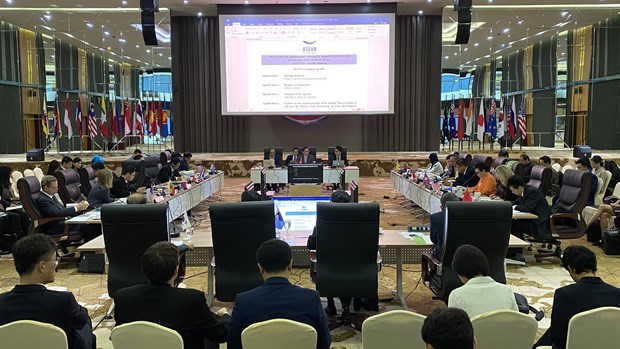Viet Nam chairs meeting of ambassadors from EAS countries
A meeting of ambassadors of East Asia Summit (EAS) member countries took place in Jakarta, Indonesia, on February 13.
 |
| An overview of the meeting (Photo: VNA) |
Ambassador Tran Duc Binh, head of the Vietnamese permanent mission to ASEAN, chaired the event, the first of its kind under Viet Nam’s ASEAN Chairmanship Year 2020, aimed to review cooperation activities within the framework of the EAS.
He highlighted the theme of a “Cohesive and Responsive ASEAN” and priorities Viet Nam has set as Chair to promote the development of the ASEAN Community and step up relations with ASEAN partners for peace and sustainable development, as well as increase the constructive role of ASEAN in the international community.
EAS countries welcomed this year’s theme and affirmed their support for Viet Nam’s priorities, saying they are ready to back ASEAN and Viet Nam in implementing these priorities along with initiatives and activities proposed by Viet Nam.
The meeting acknowledged and appreciated the positive results of cooperation activities to implement decisions made by senior leaders since 2005 and the Manila action plan for 2018-2022 to prevent terrorism and cross-border crime, intensifying ASEAN connectivity, marine cooperation, and collaboration in information technology and communications, energy, the environment and natural disaster management.
Countries also emphasised the need to cooperate in potential fields such as finance, education, climate change adaptation, plastic waste treatment at sea, and health care.
Given the complicated developments of the coronavirus disease (COVID-19), participating nations expressed their support for the Chinese government’s efforts to prevent the disease spread while stressing the importance of sharing information and experience to cope with the virus.
Regarding the East Sea, participants said ASEAN and China should reach an effective code of conduct in the East Sea (COC) in line with international law, including the 1982 UN Convention on the Law of the Sea (UNCLOS).
They emphasised the principles of self-restraint, non-militarisation, settlement of disputes based on international law and UNCLOS, while avoiding actions that could increase tensions, undermine trust, and affect the process of negotiating the COC.
Established in 2005, the EAS now has 18 member countries, including the 10 ASEAN states and their eight partners – Australia, China, India, Japan, the Republic of Korea, New Zealand, Russia and the US.
(Source: VNA)